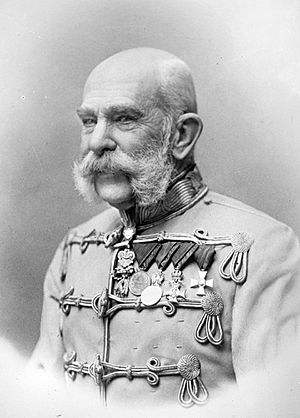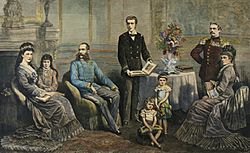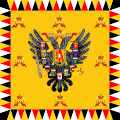Franz Joseph I of Austria facts for kids
Quick facts for kids Franz Joseph I |
|||||
|---|---|---|---|---|---|

Photograph of Franz Joseph I wearing a Hungarian Hussar cavalry uniform, c. 1903
|
|||||
| Emperor of Austria King of Hungary (more…) |
|||||
| Reign | 2 December 1848 – 21 November 1916 | ||||
| Coronation | 8 June 1867, Budapest | ||||
| Predecessor | Ferdinand I & V | ||||
| Successor | Charles I & IV | ||||
| King of Lombardy-Venetia | |||||
| Reign | 2 December 1848 – 12 October 1866 | ||||
| Predecessor | Ferdinand I | ||||
| Successor | Annexation to Italy | ||||
| Head of the Präsidialmacht Austria | |||||
| In office | 1 May 1850 – 24 August 1866 | ||||
| Predecessor | Ferdinand I | ||||
| Successor | Wilhelm I (as Head of the North German Confederation) |
||||
| Born | 18 August 1830 Schönbrunn Palace, Vienna, Austrian Empire |
||||
| Died | 21 November 1916 (aged 86) Schönbrunn Palace, Vienna, Austria-Hungary |
||||
| Burial | Imperial Crypt | ||||
| Spouse | |||||
| Issue |
|
||||
|
|||||
| House | Habsburg-Lorraine | ||||
| Father | Archduke Franz Karl of Austria | ||||
| Mother | Princess Sophie of Bavaria | ||||
| Religion | Roman Catholicism | ||||
| Signature | |||||
Franz Joseph I (born August 18, 1830 – died November 21, 1916) was a very important ruler in European history. He was the Emperor of Austria and King of Hungary for nearly 68 years. This was one of the longest reigns ever! He ruled the Habsburg monarchy, which was a huge empire.
When he first became emperor in 1848, his lands were called the Austrian Empire. Later, in 1867, they became the Austro-Hungarian Empire, a "dual monarchy" where Austria and Hungary were equal partners. Franz Joseph faced many challenges during his long rule, including wars and big changes in Europe. He also experienced many personal sad events in his family. His time on the throne ended during World War I.
Contents
Becoming Emperor: The Revolutions of 1848
Franz Joseph became emperor on December 2, 1848. He was only 18 years old. This happened during a time of big changes and revolutions across Europe. His uncle, Emperor Ferdinand, stepped down from the throne. Franz Joseph's father also gave up his right to be emperor. This made young Franz Joseph the new ruler.
At first, Franz Joseph tried to give his people a new constitution. But he soon changed his mind and ruled with strong, central power.
Fighting for Control: Wars in Italy and Hungary
Right after becoming emperor, Franz Joseph had to deal with wars. In Italy, the Kingdom of Sardinia tried to take land from Austria. Franz Joseph's army, led by Field Marshal Radetzky, won important battles. This helped Austria keep control of some Italian regions for a while.
The biggest challenge was in Hungary. The Hungarians wanted more freedom and their own government. They had passed new laws that gave them more rights. But Franz Joseph did not accept these laws. This led to a full-scale war for independence.
The Hungarian rebels were strong, and Austria struggled to defeat them. So, Franz Joseph asked for help from Tsar Nicholas I of Russia. The Tsar sent a huge army to help Austria. Together, the Austrian and Russian forces crushed the Hungarian revolution in 1849. After this, Hungary was ruled very strictly by Austria.
Surviving an Attack: The 1853 Assassination Attempt
On February 18, 1853, Franz Joseph survived an attack. A Hungarian nationalist named János Libényi tried to stab him. Luckily, the emperor was saved by his helper, Maximilian O'Donnell, and a butcher named Joseph Ettenreich.
After this attack, Franz Joseph's brother, Archduke Ferdinand Maximilian, asked royal families across Europe for money. They used the money to build a new church in Vienna, called the Votivkirche. It was built to thank God for saving the emperor's life.
Changes in the Empire: The Austro-Hungarian Compromise
The years after the revolutions were tough for Austria. They lost wars, like the Second Italian War of Independence in 1859 and the Austro-Prussian War in 1866. These defeats showed that Austria needed to change.
Creating the Dual Monarchy: Austria-Hungary
The biggest change came in 1867 with the Austro-Hungarian Compromise of 1867. This agreement gave Hungary much more power and freedom. Instead of being just part of the Austrian Empire, Hungary became an equal partner. This created the "dual monarchy" of Austria-Hungary.
On June 8, 1867, Franz Joseph was crowned King of Hungary in Budapest. This meant he was now both Emperor of Austria and King of Hungary. This new system helped keep the large empire together for many years. Franz Joseph was highly respected by his people, which also helped keep things stable.
The Bohemian Question: A Kingdom's Hopes
The people of Bohemia (now part of the Czech Republic) also wanted more rights and their own king. They hoped Franz Joseph would be crowned King of Bohemia in Prague, just like previous rulers.
However, Franz Joseph never had a separate coronation as King of Bohemia. This disappointed many Czechs. Despite some attempts to give Bohemia more power, the "Bohemian question" was never fully solved during Franz Joseph's reign. Bohemia remained part of the Austrian side of the dual monarchy.
Foreign Policy: Europe's Shifting Powers
Franz Joseph's main goal in foreign policy was to unite Germany under his family, the House of Habsburg. For centuries, the Habsburgs had led the Holy Roman Empire, which included many German states.
The German Question: Austria vs. Prussia
There were two main ideas for German unification:
- Greater Germany: This idea wanted to include Austria and its German-speaking people in a new, larger German state. If this happened, Franz Joseph would likely be the leader.
- Lesser Germany: This idea wanted to exclude Austria because it was a multi-nation empire, not just German. If this happened, the leader would be the King of Prussia, the strongest German state outside Austria.
The competition between these two ideas led to a war between Austria and Prussia in 1866. Prussia won, and this decided the "German Question." Austria was left out of the new German Empire, which was formed under Prussia's leadership.
Alliances and Tensions: The Balkans
After losing influence in Germany and Italy, Austria-Hungary focused on the Balkans. This region was a hotbed of tension because of conflicts with the Ottoman Empire and Russian Empire.
In 1908, Franz Joseph officially took over Bosnia and Herzegovina. His troops had already been occupying this area since 1878. This move angered Serbia, which wanted Bosnia for itself. This event, known as the Bosnian Crisis, increased tensions in the region.
The Start of World War I
The biggest event at the end of Franz Joseph's reign was the start of World War I.
The Assassination that Sparked a War
On June 28, 1914, Franz Joseph's nephew and heir, Archduke Franz Ferdinand, was assassinated in Sarajevo. Franz Ferdinand and his wife, Sophie, were killed by a Serbian nationalist.
When Franz Joseph heard the news, he was saddened but also saw it as a sign. He believed it was a way for a higher power to restore order. The assassination led to a series of events known as the "July Crisis."
Austria-Hungary, with support from Germany, sent a very strict ultimatum to Serbia. Serbia could not agree to all the demands. On July 28, 1914, Austria-Hungary declared war on Serbia. This quickly activated a system of alliances across Europe, pulling many countries into the conflict. Within weeks, Germany, Russia, France, and Britain were all at war. This was the beginning of World War I.
Death and Legacy
Franz Joseph died on November 21, 1916, at the age of 86, in Schönbrunn Palace in Vienna. He had ruled for almost 68 years. He died during World War I, which was still raging. He was succeeded by his grand-nephew, Charles I & IV.
Franz Joseph is buried in the Imperial Crypt in Vienna, a special burial place for Habsburg rulers.
His name lives on in places like Franz Josef Land in the Arctic and the Franz Josef Glacier in New Zealand. He also founded a university in Cluj-Napoca (now in Romania), which later moved to Szeged, Hungary.
Family Life
Franz Joseph's family life was important to him, but it also brought him much sadness.
Marriage to Empress Elisabeth ("Sisi")
Franz Joseph was expected to marry and have children quickly. His mother wanted him to marry his cousin Helene. However, Franz Joseph fell deeply in love with Helene's younger sister, Elisabeth, who was called "Sisi." She was only 15 years old.
Franz Joseph insisted on marrying Sisi, and they were married on April 24, 1854. Their marriage was not always happy. Franz Joseph loved Sisi very much, but she found court life difficult. She loved to travel and was rarely in Vienna.
They had four children:
- Sophie (died as a baby)
- Gisela
- Rudolf
- Marie Valerie
Tragedies and Loss
Franz Joseph faced many personal tragedies:
- His only son, Crown Prince Rudolf, died in 1889 in a very sad event.
- His wife, Empress Elisabeth, was assassinated by an Italian anarchist in 1898 while visiting Geneva. Franz Joseph was heartbroken and never fully recovered from her loss.
In 1885, Franz Joseph became close friends with Katharina Schratt, a famous actress. Their friendship lasted for the rest of his life, and Sisi even accepted it.
Relationship with Franz Ferdinand
Archduke Franz Ferdinand became the next in line to the throne in 1896, after Rudolf's death. Franz Joseph and Franz Ferdinand had a difficult relationship.
Their relationship became even more strained when Franz Ferdinand wanted to marry Countess Sophie Chotek. She was a noble, but not from a royal family. Franz Joseph did not approve of this marriage at first. He finally agreed in 1900, but only if their children could not inherit the throne. Franz Joseph did not even attend their wedding.
After Franz Ferdinand's assassination in 1914, Franz Joseph reportedly felt a sense of relief. He had more confidence in his new heir, his grand-nephew Charles.
Titles and Motto
Franz Joseph had many long and important titles, showing all the different lands he ruled. After 1867, his main title was "Francis Joseph the First, by the Grace of God Emperor of Austria, Apostolic King of Hungary".
His personal motto as Emperor of Austria was "With united forces" (German: "Mit vereinten Kräften" or Latin: "Viribus Unitis"). As King of Hungary, his motto was "My trust in [the ancient] virtue" (Hungarian: "Bizalmam az Ősi Erényben" or Latin: "Virtutis Confido").
Images for kids
-
Franz Joseph and his mother Archduchess Sophie, by Joseph Karl Stieler
-
The Battle of Győr on 28 June 1849. Franz Joseph enters Győr leading the Austrian troops.
-
The garter of Emperor Franz Joseph I of Austria
-
Franz Joseph among his troops at Solferino, fought during the Franco-Austrian War of 1859
-
Emperor Franz Joseph (centre in white uniform) at the Congress of German princes in Frankfurt am Main, 1863
-
Portrait of Franz Joseph I by Franz Xaver Winterhalter, 1865
-
Rival military coalitions in 1914: Triple Entente in green; Triple Alliance in brown.
-
Emperor Franz Joseph hunting with his only son Rudolf, Crown Prince of Austria.
See also
 In Spanish: Francisco José I de Austria para niños
In Spanish: Francisco José I de Austria para niños
- Family tree of German monarchs – he was related to every other ruler of Germany
- List of coupled cousins
- Austro-Hungarian entry into World War I
- Franc Jozeph Island, island in Albania named in honor of the Emperor.
- Order of St. George (Habsburg-Lorraine)
 | Charles R. Drew |
 | Benjamin Banneker |
 | Jane C. Wright |
 | Roger Arliner Young |



















